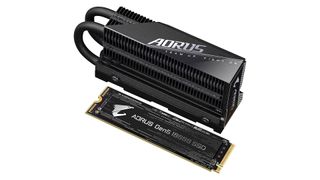We've been hearing about PCIe 5.0 for years now, and even though the first PCIe 5.0 capable PCs began shipping with Intel's 12th Gen Alder Lake CPUs in late 2021, we still haven't seen any drives for sale... until now. For the past several years, the best SSDs (or at least the fastest) have typically used a PCIe 4.0 interface, and plenty of good drives are still available with 'just' a PCIe 3.0 connection. But the fastest SSDs have been hitting the throughput ceiling on a PCIe 4.0 x4 connection for over three years, with only incremental improvements, so it's high time for something faster.
There are multiple M.2 PCIe 5.0 SSDs slated to ship this year, and the first model looks to be the Gigabyte Aorus Gen5 10000, which as the name inventively implies can deliver up to 10,000 MB/s. Earlier rumors suggested the drive would be able to hit 12,000 MB/s reads and 10,000 MB/s writes, so performance was apparently reigned in while getting the product ready for retail.
The Gigabyte Aorus SSD uses the Phison E26 controller, which will be common on a lot of the upcoming models. Silicon Motion is working on its new SM2508 controller that may offer higher overall performance, but it's a bit further out and may not ship this year. The other thing to note with the Aorus is the massive heatsink that comes with the drive, which seems to be the case with all the other Gen5 SSD prototypes we've seen as well. Clearly, these new drives are going to get just a little bit warm.
The Gigabyte drive is currently listed on Amazon (opens in new tab) and Newegg (opens in new tab), though the latter is currently sold out while the former is only available via a third-party marketplace seller — at a whopping $679.89 for the 2TB model. That's almost certainly not the MSRP or a reflection of what MSRP might end up being once the drive becomes more widely available, which should happen in the coming month or two.
The other PCIe 5.0 M.2 SSD that's now available is the Inland TD510 2TB, available at Microcenter for just $349.99 — assuming you have a Microcenter within driving distance. Inland is Microcenter's own brand of drive, and while the cooler that comes with the SSD isn't quite as large as the Aorus, it does feature a small fan for active cooling. Word is that the fan can be quite loud for something this small, so not a great feature in other words.
Like the Aorus 10000, the Inland TD510 uses the Phison E26 controller and has the same 10,000 MB/s reads and 9,500 MB/s writes specification. Where Gigabyte doesn't currently list random read/write speeds, the Microcenter page lists up to 1.5 million IOPS read and 1.25 million IOPS write for the Inland drive. Both drives also have an endurance rating of 1,400 TBW, with read/write power use of around 11W.
How will the drives perform in real-world use? That's something we can't assess yet, though we're working to get these new and upcoming M.2 Gen5 drives in for review. Perhaps with DirectStorage also coming to more games later this year, there may actually be some benefit to the additional speed for more casual users.
First PCIe 5.0 M.2 SSDs Are Now Available, Predictably Expensive

